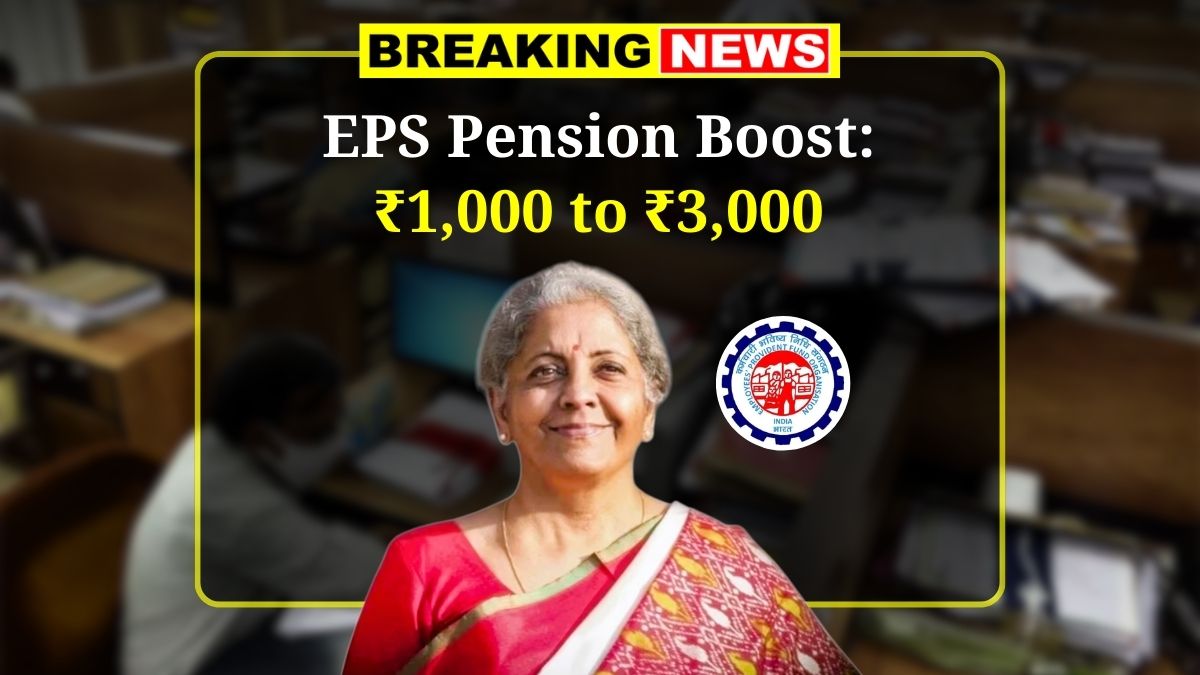EPS Pension Hike – Here’s some exciting news for millions of private sector employees in India—your monthly pension might be getting a serious boost soon. Yes, you heard that right. The central government is reportedly planning a big change in the Employees’ Pension Scheme (EPS), and if it goes through, the minimum pension amount could go up three times the current figure. That means instead of receiving just Rs 1,000 a month, pensioners might start getting Rs 3,000 every month.
This change, if approved, would bring much-needed relief to a large number of retirees who have been living on a very modest pension for years. The government has not made any changes to the EPS pension amount for several years now, and people have been raising concerns about how difficult it is to manage expenses in today’s rising cost of living. Now, it looks like those concerns might finally be addressed.
Why the Hike is Being Considered
The push for this hike isn’t coming out of nowhere. BJP MP Basavaraj Bommai has been one of the voices strongly advocating for an increase in the minimum pension amount. He has formally recommended to the Ministry of Labour that the amount be revised. The idea is to ensure that even private sector workers can enjoy a secure post-retirement life. After all, a pension is more than just money—it’s peace of mind after years of hard work.
There’s also been increasing pressure from pensioners themselves. For years, they’ve been demanding a revision of the pension amount, arguing that Rs 1,000 a month just isn’t enough to cover even basic expenses. The demand became especially prominent before the 2025 Union Budget, when pensioners called on the Finance Minister to raise the pension to Rs 7,500 per month. While that number might still be under discussion, a threefold increase to Rs 3,000 is now seriously on the table.
What is EPS and Who Benefits From It?
If you’re not familiar with EPS, here’s a quick breakdown. The Employees’ Pension Scheme (EPS) is a retirement benefit plan run by the Employees’ Provident Fund Organization (EPFO). It was launched by the Government of India to help employees in the organized private sector get a fixed monthly income after retirement. So, once you stop working, you still have a little financial cushion every month, thanks to EPS.
Employees who are part of the EPF (Employees’ Provident Fund) also become eligible for EPS. A portion of the employer’s contribution to EPF goes toward EPS. The idea behind this was to offer social security to workers who don’t have access to government pensions. But unfortunately, the amount has remained at a meager Rs 1,000 since 2014, and inflation has slowly eroded its value.
Why the Timing Feels Right
One of the reasons this pension hike is gaining momentum now is that the total EPS fund has grown significantly—it now holds over Rs 8 lakh crore. With such a massive fund pool, experts and policy advocates believe that there is financial room to support an increase in pension payouts.
Back in 2020, the Labour Ministry had actually proposed doubling the pension to Rs 2,000. But the Finance Ministry rejected the proposal at that time. Since then, inflation and growing expenses have only made the case stronger. Around 186 institutions across the country are part of the EPF-95 scheme, and all of them have been feeling the pressure from their pensioners. The demand isn’t new, but now it seems the government might finally be listening.
What This Means For You
If you’re a private sector employee contributing to EPS, this move could be a big win for your retirement planning. While Rs 3,000 per month still isn’t a massive amount, it’s certainly a better support system than the current Rs 1,000. It can help you manage essentials or simply add to your overall financial security. The hike could also set a precedent for more regular pension reviews in the future.
Of course, nothing is confirmed yet. The government is still in the decision-making phase, and it could take a few months before anything official is announced. But if all goes well, the change might be implemented in the near future—possibly before the next budget.
Disclaimer
The information provided in this article is based on current reports and statements from public figures and should not be considered final until officially confirmed by the Government of India. Plans and policies may change, and individuals are advised to keep an eye on official announcements for accurate updates.




